
Misako Nagasaka, MD, PhD, summarizes the key takeaways: proactive AE management, CNS vigilance, and strategic sequencing as hallmarks of modern care for EGFR-mutant NSCLC.

Your AI-Trained Oncology Knowledge Connection!


Misako Nagasaka, MD, PhD, summarizes the key takeaways: proactive AE management, CNS vigilance, and strategic sequencing as hallmarks of modern care for EGFR-mutant NSCLC.

The discussion underscores the role of multidisciplinary coordination in maintaining adherence, quality of life, and long-term therapeutic benefit.

Experts debate when to introduce chemotherapy, how to manage its cumulative toxicity, and how to de-escalate maintenance regimens.

The panel explores integrating molecular data to guide therapy selection and optimize sequencing strategies after resistance emerges.

A second case illustrates clinical decision-making after progression on osimertinib, highlighting diagnostic re-biopsy and ctDNA testing.

The conversation shifts to how dual EGFR-MET inhibition reduces resistance mutations and molecular heterogeneity compared with osimertinib monotherapy.

The panel reviews components of the COCOON prophylactic regimen and the safe use of temporary dose modifications to maintain adherence.

Discussion centers on early dermatologic AEs with amivantamab plus lazertinib, emphasizing prevention protocols and staff education.

The physicians share real-world imaging schedules, triggers for adding local therapy, and lessons from serial MRI data in the MARIPOSA trial.

The panel examines a 59-year-old woman with small brain metastases, addressing therapy selection to balance CNS control, survival, and quality of life.

Experts discuss applying emerging evidence from MARIPOSA and FLAURA2 to first-line decision-making in EGFR-mutated disease.

Misako Nagasaka, MD, PhD, Dr. Nagasaka introduces the panel and outlines the session’s focus on applying new EGFR-mutated NSCLC data to practice, with emphasis on CNS control and toxicity prevention.
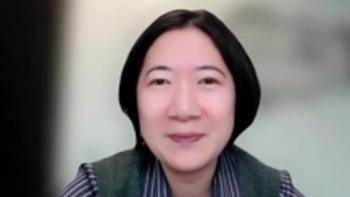
Treatment with lorlatinib might be effective regardless of the presence of central nervous system metastases, according to Misako Nagasaka, MD, PhD.

Most central nervous system events with lorlatinib were grade 1 or 2 in the phase 3 CROWN trial.

Treatment with lorlatinib did not increase cardiovascular events among patients with ALK-positive non–small cell lung cancer in the CROWN trial.

At 5 years, 60% of patients who received lorlatinib in the phase 3 CROWN study achieved progression-free survival.
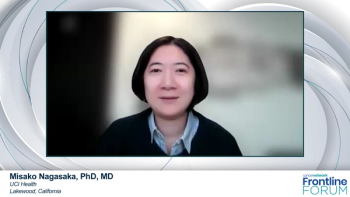
Panelist discusses how HER2-directed tumor-agnostic treatments are likely to see expanded applications across multiple cancer types, driven by improved biomarker testing and emerging clinical evidence. This approach may become increasingly personalized through enhanced molecular profiling, potentially leading to more precise patient selection and combination strategies.

Panelist discusses how the DESTINY-PanTumor02 study enrolled 267 patients with different tumor types, including endometrial, cervical, ovarian, bladder, biliary tract, and pancreatic cancer.

Panelist discusses how HER2-directed tumor-agnostic therapies represent an emerging treatment paradigm focused on targeting HER2 mutations regardless of cancer type. Current agents such as trastuzumab deruxtecan show promise across multiple tumor types that express HER2, moving beyond traditional cancer-specific approaches. This precision medicine strategy may expand treatment options and improve outcomes for patients with HER2-altered cancers who previously had limited therapeutic choices.

Panelist discusses how the DESTINY-Lung02 trial was a dose optimization study where patients with HER2-mutated non–small cell lung cancer (NSCLC) were randomly assigned to a starting dose of 5.4 mg/kg vs 6.4 mg/kg of trastuzumab deruxtecan (T-DXd). DESTINY-Lung03 was a frontline study for HER2 overexpression in NSCLC looking at different combinations of treatment with T-DXd and immunotherapy agents with or without chemotherapy.

Panelist discusses how HER2 testing evaluates protein overexpression, gene amplification, and mutations. Although breast and gastric cancers typically show overexpression/amplification, other tumors more commonly harbor mutations.

Introduction to HER2-Directed Tumor-Agnostic Approaches
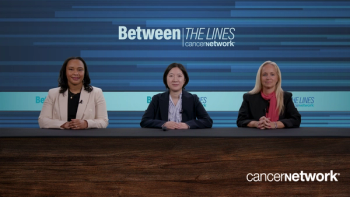
Panelists discuss key takeaways from the analysis and offer clinical pearls on incorporating prophylactic dexamethasone 8 mg into treatment with amivantamab and lazertinib for community colleagues.

Panelists discuss other adverse events associated with amivantamab and lazertinib beyond infusion-related reactions.

Panelists discuss the clinical implications of the SKIPPirr trial data presented at the 2024 World Congress on Lung Cancer, including whether it might reduce resistance to using this combination in practice, how to implement supportive measures such as prophylactic dexamethasone 8 mg, potential barriers to implementation, strategies to overcome these barriers, and ways to educate patients about infusion-related reactions and the benefits of prophylactic measures.

Panelists discuss the frequency, timing, and symptoms of infusion-related reactions with amivantamab plus lazertinib, how these drugs compare with other treatments such as datopotamab deruxtecan (DXd) or patritumab DXd (HER3-DXd), and the management strategies and prophylactic measures used, especially for patients with EGFR exon 19 or L858R advanced/metastatic non–small cell lung cancer who have experienced progression on prior therapies.

Panelists discuss how amivantamab, FDA approved for first-line treatment of advanced non–small cell lung cancer with specific EGFR mutations, can lead to significant infusion-related reactions, including serious cases that may require dose adjustments or discontinuation.

Misako Nagasaka, MD, PhD, discussed the approval of amivantamab plus chemotherapy for patients with EGFR exon 20 insertion mutations non–small cell lung cancer.
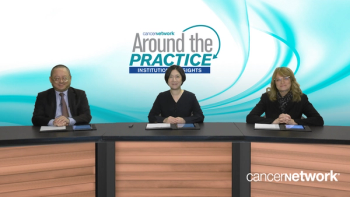
The panelists close their discussion on non-small cell lung cancer by emphasizing the need for continued research, early screening, and collaboration with dermatologists to address the unmet needs and improve overall outcomes.
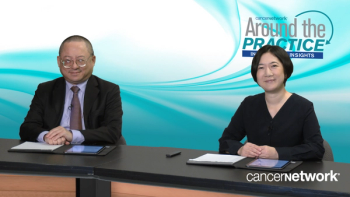
Dr Sai-Hong Ou discusses the future of treatment for non-small cell lung cancer with EGFR exon 20 insertion mutations, highlighting the complexity of these mutations and the need for precision treatments.
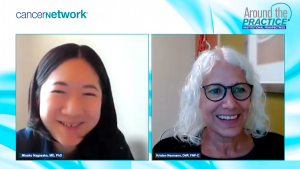
Published: October 16th 2023 | Updated:

Published: October 23rd 2023 | Updated:
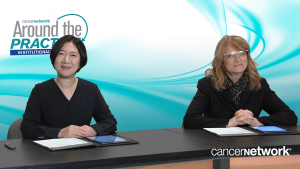
Published: November 27th 2023 | Updated:
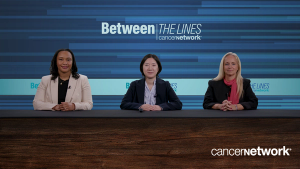
Published: October 15th 2024 | Updated:

Published: November 20th 2023 | Updated:

Published: October 8th 2024 | Updated: